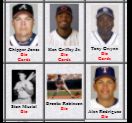1999 Team Best MINOR LEAGUE - BASEBALL AMERICA GOLD FOIL-COMPLETE SET(100)
Scarce parallel issue of 1999's Top 100 Prospects. w/Lance Berkman, Rick Ankiel, Milton Bradley ...

Please wander around the website for more info, prices, values & images
on vintage baseball, football, basketball, hockey, sport and non-sports cards.


1970 O-Pee-Chee (OPC) Baseball |

Tony Gwynn, Padres Right -Fielder
|

There are many different ways to protect, organize and store your sports cards.
Soft Sleeves also called "penny sleeves" are the most basic protection for your cards. Made of thin plastic, they come in packs of 100 and are very inexpensive.
Top Loads are rigid plastic holders and a step up in protection over "soft sleeves". Called top-loads because you place the card thru a thin opening at the top. They come in many sizes for regular cards upto 8-1/2 x 11 for magazines and even larger.
Screw-Down Acrylic Holders
These are sometimes used for better, more expensive cards. Small screws hold
two pieces of clear acrylic together. In a variety of sizes and thickness
that not only protect the card but can funciton as a paper weight or display
item.
There are also Single-Screw Screw-Downs that use only 1 screw to seal the holder. They are easier to use and provide the same type of protectionas regular screwdowns and they are also much less expensive costing as little as .30 in quantity while 1 inch or 2 inch acrylic screw-downs can cost upto several dollars.
 Click here to view other players
Click here to view other players
